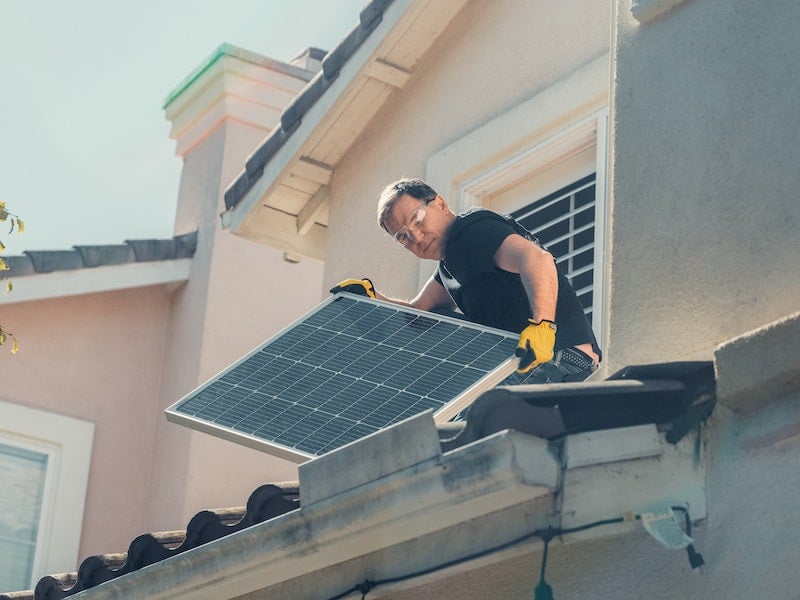
A Guide to Solar Panels for Your Home
Thinking about buying solar panels? Learn how solar panels work and if they make financial sense for your home.
Is solar right for you?
Find out in less than a minute.
If you’re looking to reduce your environmental footprint, solar panels can be an excellent option. They are a great way to power your home more efficiently as they harness the energy of a powerful and clean renewable resource.
What are residential solar panels?
Residential solar panels power your home using the sun’s energy instead of traditional electricity. When sunlight hits solar panels, an electric current is created. The solar cells within the panels then convert the sunlight into electrical energy in the form of direct current (DC) power. This direct current electricity is converted into alternating current (AC) power and can be used to power your home or stored in a battery for later use.
How much do solar panels cost?
The cost of solar panels depends on where you live and which system you choose. According to EcoWatch the average cost for a 5-kW solar panel system is $10,878 and $21,756 for a 10kW system.
However, these cost estimates do not include the various benefits that come along with installing residential solar panels! There is currently a federal tax credit, known as the Solar Investment Tax Credit, of 30% for homeowners who install residential solar panels in 2022-2032. This credit will effectively knock a few thousand dollars off the cost of the system. Additionally, there are several local rebates and credits available to alleviate any financial strain of residential solar panel installation.
To reduce costs, there are also options for installing solar panels that do not involve purchasing your own system outright. You may be able to lease your system or enter a power purchase agreement with a third-party developer.
SRECs: Solar Renewable Energy Certificates
Solar Renewable Energy Certificates (SRECs) are incentives for solar that enable homeowners to sell certificates for energy to their utility. Homeowners earn one SREC for every 1000 kilowatt-hours (kWh) produced by their solar system. The value of SRECs varies by state, but can be worth up to $300. SRECs make solar systems much more financially viable.
States with SRECs
Most states do not offer SRECs. These are the states that offer solar renewable energy credits:

Keep in mind: If you don't purchase your solar panel system, you won't be able to take advantage of the tax credits and rebates.
How to choose the best solar panels for your home
Navigating the extensive realm of residential solar panels can be intimidating, and not every home is well-suited for residential solar panels. For example, you’ll need to consider your roof’s age and when it will need to be replaced, the shape and slope of your roof, and how shaded your roof is. To take the first step and determine your home’s suitability for solar, you’ll want to start with a reliable mapping tool that quantifies your solar rooftop potential.
Next, check your past energy bills to see your kilowatt-hours usage for an understanding of how much energy you typically use and need. Once you have an idea of your energy needs, it’s time to find a certified installer who can help you select and install the best residential solar panels and the right-sized system for your home. Like any major purchase, it’s a wise idea to collect bids from three or more providers in your area.
Important factors you’ll want to consider when evaluating solar panel systems include the following:
You will want to shop around — there are a lot of options out there! Don’t be afraid to do your research and ask a lot of questions.
Benefits of residential solar
If your home receives a lot of direct sunlight year-round, it can be an ideal location for a home solar energy system. Here are just a few benefits of residential solar:
Homes with solar panels installed generally sell for 4.1% more than those without, according to a 2019 study by Zillow. Homebuyers are looking for efficiency! In fact, 80% of homebuyers said energy-efficient features are important to them.
Powering your home with green, renewable solar energy is a win for the environment. Traditional electricity is produced by burning fossil fuels, thereby releasing harmful toxic fumes and greenhouse gases into the air. Solar energy is clean and limitless. Utilizing solar energy helps you lower your own carbon footprint while reducing reliance on non-renewable fossil fuels.
Even if solar isn't right for your home, there are still many ways you can reduce your carbon footprint. Reducing your carbon footprint can be as simple as tweaking some of your energy habits, like taking shorter showers or driving less.
Depending on the size of your home and your typical energy usage, solar panels can compensate for at least half of your home’s electricity. That means cutting your energy bill in half — or more!
The initial cost of installing residential solar panels may be expensive. Pricing varies but you can expect to pay $20k-$40k. The goal is to generate enough energy to pay off in the long term by offsetting the cost of your electricity bill. The average payback period is about 8 years, meaning it will take less than a decade for your solar panels to pay for themselves. Your payback period will depend on your cost of solar panels, the amount of energy you generate, and what SRECs or local credits are available. According to EnergySage, new solar technology costs less in the long-term, generating savings of $10K to almost $30K after a 20-year period.
How to find a renewable energy plan
If you are still deciding if solar energy is the right choice for you, there are other ways to save on your energy bills and reduce your environmental impact without the hefty upfront price tag. EnergyBot can help homeowners find a renewable energy plan at the best rates. Just enter your zip code to get started today!
Written by Thad Warren
Thad is a native Texan who has worked in the energy industry for just over 5 years.
Connect
Recent Posts
Compare Texas Solar Buyback Plans
Discover the best Texas solar energy buy back programs for 2025! Compare rates, terms, and providers to maximize savings and make the most of your solar investment.
September 2025

7 minutes

How Efficient Are Solar Panels
How efficient are solar panels compared to other types of energy generation?
March 2023

4 minutes

What You Need To Know About The California Solar Mandate
Learn how the California Solar Mandate changes how new homes are built.
July 2023

4 minutes


.jpeg)
